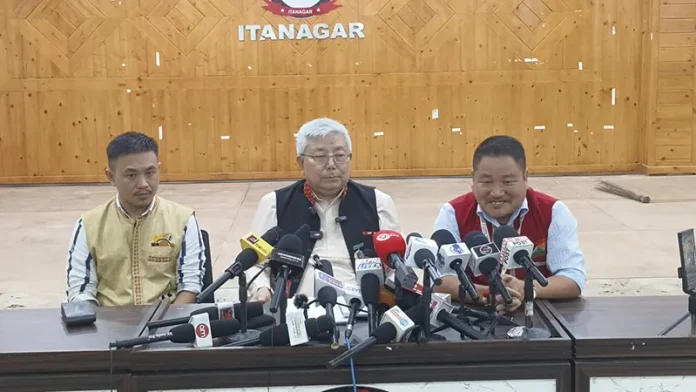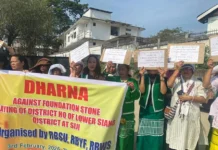ITANAGAR, 12 Aug: Expressing displeasure over the resolution adopted by the Arunachal Pradesh Congress Committee (APCC) on 7 August, demanding the repeal of the Arunachal Pradesh Freedom of Religion Act (APFRA), 1978, the Indigenous Faith & Cultural Society of Arunachal Pradesh (IFCSAP) said it will not tolerate any political party attempting to turn the APFRA into a political tool for appeasing specific religious interests.
Calling upon the APCC to withdraw its resolution and return to the principles of true secularism, “which means standing for all communities equally, not selectively defending one particular religion,” IFCSAP president Dr Emi Rumi, addressing mediapersons at the APC on Tuesday, said that the APFRA is not a tool of discrimination; it is a shield for the vulnerable, marginalized, and indigenous communities of Arunachal Pradesh.
“It is truly sad and shocking that a 140-year-old party, historically known for its secular ideals, has chosen to speak on behalf of a single religious group,” he added.
“The indigenous faith believers and other communities of Arunachal Pradesh feel deeply hurt by the APCC’s statement, which openly aligns with the interests of only one religion – the very religion that has been resisting tooth and nail the implementation of the Act,” Rumi said, questioning, “Does the APCC truly represent all the diverse faiths and communities, or is it selectively pandering to one group’s agenda?”
Informing that the APFRA was passed in 1978, when Arunachal was still a union territory, Rumi said that the administration headed by Prem Khandu, who was in office from 13 August, 1975 to 18 September, 1979, agreed to enact the APFRA to safeguard against aggressive conversion that threatened indigenous cultural integrity.
“We now wonder: why has the Congress switched sides, abandoning the very principle it instituted, at the drop of a hat and seemingly for political expediency,” said Rumi.
According to the 2011 census, the converted population from indigenous people to Christianity reached 4,18,732, and therefore the IFCSAP is concerned about the potential demographic shift in Arunachal, claimed the society.
Stating that without the APFRA’s protection there is risk of a “lost generation – our children severed from ancestral spiritual roots and our indigenous faiths marginalized or extinguished,” the society went on to state that the APFRA does not violate Article 25 of the Indian Constitution, as claimed by the APCC.




